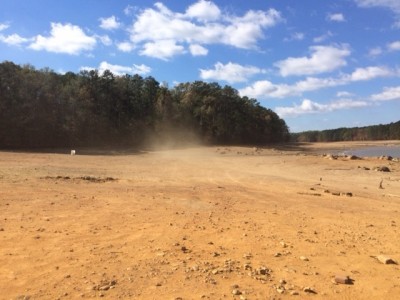Limiting water use during a drought and making sure farmers and corporations are using water most efficiently– those are just a few things a state water plan would address. And they’re the same type issues at the center of the long-running water wars between Florida and Georgia. Those states have been fighting over who is hogging up state water resources. The Supreme Court will hear that case this term. Meanwhile, Alabama has no plan for managing its water, and that worries some people.
The state has 132,000 miles of streams and rivers. And if your land touches that water, for the most part, you can take all you want. Most states have rules about who gets how much water, and when; not Alabama.
“It turns out that you actually don’t need any permission to take water out of the rivers,” says Mitch Reid, program director for the Alabama Rivers Alliance. “Most states have a state water management system or plan that says here’s how much is available for use and here’s how much you can take.”
Reid says a water management plan would allow the state to regulate water use, ensuring that homeowners, businesses, and wildlife could each get what they need. Right now, the state has no authority over water usage, even in times of drought or flood.
He says water utilities have been slow to impose restrictions, such as asking people not to water their lawns. “Voluntary restrictions do not work in crisis, and an uncoordinated set of policies among different utilities is just frankly absurd because you see something like Trussville.”
Reid is referring to last fall when the Birmingham Water Works waited until the drinking water reservoir was all but dry before enacting restrictions. Trussville’s utility did not restrict usage, so it pumped out groundwater—water that would have seeped into the Cahaba River and flowed down to Birmingham. Instead, Birmingham had to buy water from Irondale at double the cost.
“Triggering your drought response to when the well runs dry, when the drinking water runs dry, is really too little too late,” says Reid.
In 2012, former Governor Robert Bentley formed a task force to recommend a state water management plan. Over the next five years, the group met with farmers, power companies, and environmental groups.
This January, the group delivered a plan. But Bentley resigned in April, and now the proposal is with Governor Kay Ivey. Ivey’s office declined an interview, but emailed a statement saying her administration is evaluating the water policy.
Meanwhile, state Representative Patricia Todd says she will present a bill next session that would give the state the authority to allocate water so that everyone is satisfied. Todd has an idea why past attempts at plans have failed. “Oh, the big mules in the state!” she says. “Farmers and Alabama Power have been in opposition to this because they want access to that water. We believe that we can win the public support on this, and overcome the money that they might put in opposition to it.”
Alabama Power manages 14 hydro-electric power plants along three rivers. They and the Alabama Farmer’s Federation each declined an interview. But Alabama Power emailed a statement saying the utility is “committed to protecting the state’s important water resources.”
Todd believes there’s a common-sense approach that could satisfy even the big players. “We need to all work together to develop a reasonable policy,” she explains, “so that they’re not adversely harmed but they don’t have a monopoly on the use of that water.”
Supporters of a water plan say that after five years of discussion, it’s time for the state’s proposal to see the light of day.

